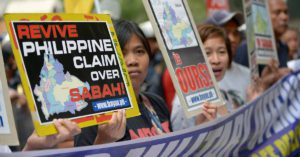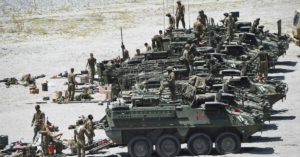
One of the many important questions in Philippine foreign policy that has been consistently asked by Filipinos and people in the foreign policy circle since 1946 when the Philippines had its independence from the Americans until today is, “if Filipinos are better off with the Americans, or without them?
It can be noted that on July 4 1946, the Philippines was granted full independence by the United States, nevertheless, before that, the country was a protectorate of the US. The period 1898 to 1946 denotes the era of direct American colonization of the Philippines.
Nevertheless, even after the Americans granted “full independence” to the Philippines, the country was never really free and sovereign in the truest and proper sense of these words for it was and still is to some extent under “semi-colonial” control of the US.
Although the US military bases were shut down/closed in 1992 as a consequence of the 12-11 votes of the Philippines Senate in 1991, rejecting the extension of the 1947 Military Bases Agreement (MBA), saying the said agreement was “one-sided,” nevertheless, remnants and the residues of the MBA are still very much felt in the country until today in many forms but more prominently exemplified by the effectual and continuous existence of the skew-whiff Mutual Defense Treaty (MDT), the Visiting Forces Agreement (VFA) and the Enhanced Defense Cooperation Agreement (EDCA) between the US and the Philippines. Because of these agreements, the Philippines substantially remains within the US sphere of influence to date.
No doubt about it, for more than a century, the Philippines has been an important instrument and outpost to America’s defense and security strategy in the Pacific. It is thus far a major non-NATO (North Atlantic Treaty Organization) ally of the US.
However, given the new geopolitical realities, configurations, and considerations, it is but important for Filipinos to reflect if indeed they want the Philippines to stay within the ambit of US influence or not; reflect more on the costs and benefits of having US military presence in the country, and if down the road, the country will benefit more from the continuous US military presence or not.
Thus, it is again imperative to ask the question, “Is the Philippines better off with the Americans or without them?
VFA Not Needed
Right after the Second World War, right after the granting of “full independence and sovereignty” to the Philippines by the Americans in 1946, the country entered the community of nations on the back foot because of the devastation brought about by World War II. With a destroyed economy and the imminent threat of the Cold War at that time, the Philippines did not have much leverage either many options not to maintain closer ties with the U.S. to protect the country that led to the signing of the MDT and the MBA between the Philippines and the US.
But I guess the situation nowadays is completely different.
At present, there are no significant imminent signs of danger at least militarily that will directly threaten the Philippines unless the US pursues its antagonistic stance and its provocation against China using the Philippines as a springboard, which will be most unfortunate.
The current security environment thus far is entirely different than it was during the Cold War. Thus, I would argue that we don’t need the VFA, the EDCA, and even the MDT unless their uneven and lopsided provisions will be dealt with and revised, and compensation will be paid to the Philippines by the US government.
China Threat?
To even justify the need to continue the VFA or the EDCA as championed by some pro-American political personalities in the country because of the so-called “China threat,” demonizing China by painting impressions in the minds of the Filipino people that China will “invade” the country, spreading the notion of an aggressive Chinese navy prowling the Western Pacific or the South China Sea (SCS), which according to these Sinophobes is threatening the sea-lanes in the disputed waters of the SCS, connecting it to the newly enacted China Coast Guard Law, which is, by the way, is a domestic policy of China, that has been tagged as a “declaration of war” by China, are again far-fetched and misplaced concerns that belong in the realm and sphere of paranoid fantasy.
Such enunciations and painting China as if it is an imminent danger and an enemy of the Philippines just because it is a rising contending superpower both economically and militarily are but exaggerated paranoia and baseless accusations.
Though it is quite true that in some instances and circumstances in the recent past and probably even in the foreseeable future, Chinese fishermen and vessels did harass fishermen and fishing vessels of other countries like the Philippines as they were perceived to be encroaching on Chinese “territory,” these kinds of incidents are not new at all, and thus far, is it not only China per se that have done this, other parties to the dispute over the SCS have also done this.
Even the Philippines is not an exception here. Incidents of these kinds happen at various times among various parties and they are quite common scenes since the SCS has been a contested area for a long time. These kinds of minor skirmishes and conflicts are pragmatically expected and can’t be controlled totally by anyone at all from happening from time to time.
That’s a reality. However, thus far, no serious military confrontations tantamount to war had happened, and I guess that the most important thing to take note of and to avoid by all parties concerned. Hence, exaggerating and inflating the situation in the SCS out of proportion is a deceitful way of justifying the need for the VFA or EDCA to continue given that these are lopsided and biased agreements to American strategic interests vis-à-vis the national security and interests of the Philippines.
On another note, on the reverse, the continuous presence of the US military forces (i.e., troops and equipment) in the country might lead to a “self-fulfilling prophecy” by these pro-American- Sinophobes political personalities, if Chinese officials somehow would conclude that indeed the US military presence in the Philippines is to counter, contain, intimidate and provoke China antagonistically and aggressively. But of course, we hope that this will never happen at all.
Nevertheless, it’s unlikely that China will declare war or invade the Philippines or any countries at all for that matter simply because China lacks both the intent and is not interested in launching a concerted expansionist campaign similar to what the US did before and after World War II. China is much more inward-looking, more focused on trying to ensure domestic economic development and prosperity for its 1.4 billion population. But of course, like any other state, it will always protect and promote its national integrity, security, and interests.
That’s but natural for any state. Also, the economic, political, and military capabilities of other regional actors are continuously growing, which may also serve as a deterrent if Beijing decides to be more aggressive vis-à-vis other claimant-states over the contested waters of the SCS, which is I think in the foreseeable and near future is unlikely.
On the other hand, it is no longer even arguable that the US is the only power capable of preventing or repelling aggression. Security threats for that matter can even be met by middle or lesser powers, acting either individually or collectively nowadays with the help and assistance of international and regional bodies like the United Nations Security Council (UNSC) or the United Nations (UN) in general, the European Union (EU) and even ASEAN (Association of Southeast Asian Nations).
Conclusion
Thus, I would argue that if the lopsided provisions, terms, and conditions of the VFA and the EDCA are not revised to more symmetrical and balanced terms, and if the US government will not compensate the Philippines properly, then what’s in it for the Philippines then? Therefore, there is no reason to continue these agreements and much more there’s no reason to maintain a US military presence in the country. Likewise, the abrogation of the VFA will to some extent undermine the MDT and EDCA, thereby, opening more avenues and space for the Philippines to maneuver if either it will negotiate with the US or any other country for that matter for a new treaty/agreement that is more symmetrical and reciprocal or not. At least the Philippines has that option and is not “tied-bound to the US.”
Furthermore, the abrogation of the VFA and even of EDCA will further establish the prospect of “non-aligned” Philippines as a reflection and in pursuance of the Duterte administration’s “independent foreign policy.” At the end of the day, I would argue that the best way forward is to continue and uphold the “independent foreign policy” or the “non-aligned stance” of President Rodrigo Duterte, – “the Philippines is a friend to all and an enemy to none,” for it is the way forward to a more stable and war/tension free Philippines.
Lastly, in this day and age, maintaining the VFA and EDCA or even the MDT is an anti-thesis to the pursuit of an “independent foreign policy and non-aligned stance” of the Philippines. These agreements are symbols and consummation of US domination in the country, reminders of the colonial era and the interventionalist agenda of the US. The continuous presence of military forces in the country is no doubt a remnant of colonialism that I guess Filipinos should put an ending to.
Just like what Senator Claro M. Recto said, the Philippines needs a foreign policy that is based on its national interests and security and not those of the US.
Thus, it is therefore in the best interests of the Philippines to abrogate the lopsided VFA/EDCA and even the MDT, and if can’t be helped replaced them with more balanced and symmetrical agreements more advantageous and beneficial to the Philippines.
This approach to foreign policy of the country would increase more the peace and stability of not only the Philippines but also of the region as a whole.
Source: Sovereign PH
https://sovereignph.com/2021/02/23/is-the-philippines-better-off-without-the-vfa-edca-or-not/



